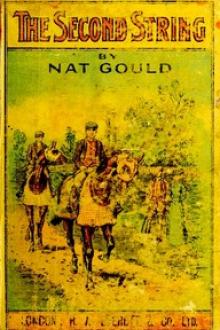Iron Throne by Ellen Gould-Harmon (readict .txt) 📕

- Author: Ellen Gould-Harmon
Book online «Iron Throne by Ellen Gould-Harmon (readict .txt) 📕». Author Ellen Gould-Harmon
When powerful foes were uniting to overthrow the reformed faith, and thousands of swords seemed about to be unsheathed against it, Luther wrote: "Satan is putting forth his fury; ungodly pontiffs are conspiring; and we are threatened with war. Exhort the people to contend valiantly before the throne of the Lord, by faith and prayer, so that our enemies, vanquished by the Spirit of God, may be constrained to peace. Our chief want, our chief labour, is prayer; let the people know that they are now exposed to the edge of the sword and to the rage of Satan, and let them pray."-- D'Aubigne, b. 10, ch. 14.
Again, at a later date, referring to the league contemplated by the reformed princes, Luther declared that the only weapon employed in this warfare should be "the sword of the Spirit." He wrote to the elector of Saxony: "We cannot on our conscience approve the proposed alliance. We would rather die ten times than see our gospel cause one drop of blood to be shed. Our part is to be like lambs of the slaughter. The cross of Christ must be borne. Let your highness be without fear. We shall do more by our prayers than all our enemies by their boastings. Only let not your hands be stained with the blood of your brethren. If the emperor requires us to be given up to his tribunals, we are ready to appear. You cannot defend our faith: each one should believe at his own risk and peril."-- Ibid., b. 14, ch. 1.
From the secret place of prayer came the power that shook the world in the Great Reformation. There, with holy calmness, the servants of the Lord set their feet upon the rock of His promises. During the struggle at Augsburg, Luther "did not pass a day without devoting three hours at least to prayer, and they were hours selected from those the most favourable to study." In the privacy of his chamber he was heard to pour out his soul before God in words "full of adoration, fear, and hope, as when one speaks to a friend." "I know that Thou art our Father and our God," he said, "and that Thou wilt scatter the persecutors of Thy children; for Thou art Thyself endangered with us. All this matter is Thine, and it is only by Thy constraint that we have put our hands to it. Defend us, then, O Father!"-- Ibid., b. 14, ch. 6.
To Melanchthon, who was crushed under the burden of anxiety and fear, he wrote: "Grace and peace in Christ--in Christ, I say, and not in the world. Amen. I hate with exceeding hatred those extreme cares which consume you. If the cause is unjust, abandon it; if the cause is just, why should we belie the promises of Him who commands us to sleep without fear? . . . Christ will not be wanting to the work of justice and truth. He lives, He reigns; what fear, then, can we have?"-- Ibid., b. 14, ch. 6.
God did listen to the cries of His servants. He gave to princes and ministers grace and courage to maintain the truth against the rulers of the darkness of this world. Saith the Lord: "Behold, I lay in Zion a chief cornerstone, elect, precious: and he that believeth on Him shall not be confounded." 1 Peter 2:6. The Protestant Reformers had built on Christ, and the gates of hell could not prevail against them.
The Protest of Spires and the Confession at Augsburg, which marked the triumph of the Reformation in Germany, were followed by years of conflict and darkness. Weakened by divisions among its supporters, and assailed by powerful foes, Protestantism seemed destined to be utterly destroyed. Thousands sealed their testimony with their blood. Civil war broke out; the Protestant cause was betrayed by one of its leading adherents; the noblest of the reformed princes fell into the hands of the emperor and were dragged as captives from town to town. But in the moment of his apparent triumph, the emperor was smitten with defeat. He saw the prey wrested from his grasp, and he was forced at last to grant toleration to the doctrines which it had been the ambition of his life to destroy. He had staked his kingdom, his treasures, and life itself upon the crushing out of the heresy. Now he saw his armies wasted by battle, his treasuries drained, his many kingdoms threatened by revolt, while everywhere the faith which he had vainly endeavoured to suppress, was extending. Charles V had been battling against omnipotent power. God had said, "Let there be light," but the emperor had sought to keep the darkness unbroken. His purposes had failed; and in premature old age, worn out with the long struggle, he abdicated the throne and buried himself in a cloister.
In Switzerland, as in Germany, there came dark days for the Reformation. While many cantons accepted the reformed faith, others clung with blind persistence to the creed of Rome. Their persecution of those who desired to receive the truth finally gave rise to civil war. Zwingli and many who had united with him in reform fell on the bloody field of Cappel. Oecolampadius, overcome by these terrible disasters, soon after died. Rome was triumphant, and in many places seemed about to recover all that she had lost. But He whose counsels are from everlasting had not forsaken His cause or His people. His hand would bring deliverance for them. In other lands He had raised up labourers to carry forward the reform.
In France, before the name of Luther had been heard as a Reformer, the day had already begun to break. One of the first to catch the light was the aged LeFevre, a man of extensive learning, a professor in the University of Paris, and a sincere and zealous papist. In his researches into ancient literature his attention was directed to the Bible, and he introduced its study among his students. LeFevre was an enthusiastic adorer of the saints, and he had undertaken to prepare a history of the saints and martyrs as given in the legends of the church. This was a work which involved great labour; but he had already made considerable progress in it, when, thinking that he might obtain useful assistance from the Bible, he began its study with this object. Here indeed he found saints brought to view, but not such as figured in the Roman calendar. A flood of divine light broke in upon his mind. In amazement and disgust he turned away from his self-appointed task and devoted himself to the word of God. The precious truths which he there discovered he soon began to teach.
In 1512, before either Luther or Zwingli had begun the work of reform, LeFevre wrote: "It is God who gives us, by faith, that righteousness which by grace alone justifies to eternal life."--Wylie, b. 13, ch. 1. Dwelling upon the mysteries of redemption, he exclaimed: "Oh, the unspeakable greatness of that exchange,--the Sinless One is condemned, and he who is guilty goes free; the Blessing bears the curse, and the cursed is brought into blessing; the Life dies, and the dead live; the Glory is whelmed in darkness, and he who knew nothing but confusion of face is clothed with glory."-- D'Aubigne, London ed., b. 12, ch. 2.
And while teaching that the glory of salvation belongs solely to God, he also declared that the duty of obedience belongs to man. "If thou art a member of Christ's church," he said, "thou art a member of His body; if thou art of His body, then thou art full of the divine nature. . . . Oh, if men could but enter into the understanding of this privilege, how purely, chastely, and holily would they live, and how contemptible, when compared with the glory within them,-- that glory which the eye of flesh cannot see,--would they deem all the glory of this world."-- Ibid., b. 12, ch. 2.
There were some among LeFevre's students who listened eagerly to his words, and who, long after the teacher's voice should be silenced, were to continue to declare the truth. Such was William Farel. The son of pious parents, and educated to accept with implicit faith the teachings of the church, he might, with the apostle Paul, have declared concerning himself: "After the most straitest sect of our religion I lived a Pharisee." Acts 26:5. A devoted Romanist, he burned with zeal to destroy all who should dare to oppose the church. "I would gnash my teeth like a furious wolf," he afterward said, referring to this period of his life, "when I heard anyone speaking against the pope."-Wylie, b. 13, ch. 2. He had been untiring in his adoration of the saints, in company with LeFevre making the round of the churches of Paris, worshipping at the altars, and adorning with gifts the holy shrines. But these observances could not bring peace of soul. Conviction of sin fastened upon him, which all the acts of penance that he practiced failed to banish. As to a voice from heaven he listened to the Reformer's words: "Salvation is of grace." "The Innocent One is condemned, and the criminal is acquitted." "It is the cross of Christ alone that openeth the gates of heaven, and shutteth the gates of hell." -- Ibid., b. 13, ch. 2.
Farel joyfully accepted the truth. By a conversion like that of Paul he turned from the bondage of tradition to the liberty of the sons of God. "Instead of the murderous heart of a ravening wolf," he came back, he says, "quietly like a meek and harmless lamb, having his heart entirely withdrawn from the pope, and given to Jesus Christ."--D'Aubigne, b. 12, ch. 3. While LeFevre continued to spread the light among his students, Farel, as zealous in the cause of Christ as he had been in that of the pope, went forth to declare the truth in public. A dignitary of the church, the bishop of Meaux, soon after united with them. Other teachers who ranked high for their ability and learning joined in proclaiming the gospel, and it won adherents among all classes, from the homes of artisans and peasants to the palace of the king. The sister of Francis I, then the reigning monarch, accepted the reformed faith. The king himself, and the queen mother, appeared for a time to regard it with favour, and with high hopes the Reformers looked forward to the time when France should be won to the gospel.
But their hopes were not to be realized. Trial and persecution awaited the disciples of Christ. This, however, was mercifully veiled from their eyes. A time of peace intervened, that they might gain strength to meet the tempest; and the Reformation made rapid progress. The bishop of Meaux laboured zealously in his own diocese to instruct both the clergy and the people. Ignorant and immoral priests were removed, and, so far as possible, replaced by men of learning and piety. The bishop greatly desired that his people might have access to the word of God for themselves, and this was soon accomplished. LeFevre undertook the translation of the New Testament; and at the very time when Luther's German Bible was issuing from the press in Wittenberg, the French New Testament was published at Meaux. The bishop spared no labour or expense to circulate it in his parishes, and soon the peasants of Meaux were in possession of the Holy Scriptures.
As travellers perishing from thirst welcome with joy a living water spring, so did these souls receive the message of heaven. The labourers in the field, the artisans in the workshop, cheered their daily toil by talking of the precious truths of the Bible. At evening, instead of resorting to the wine-shops, they assembled in one another's homes to read God's word and join in prayer and praise. A great change was soon manifest in these communities. Though belonging to the humblest class,





Comments (0)